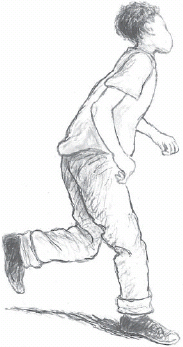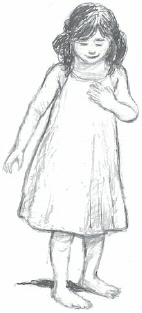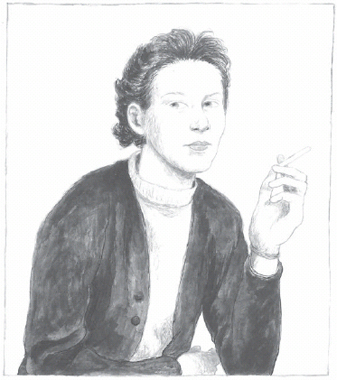Ordinary Sins (5 page)
Authors: Jim Heynen
When the sun on her eyes woke her the next morning, the girl had itchy ears again. This time when she scratched her ears she caught a leaf under her fingernails. When she looked in the mirror, she saw small cherry branches growing from her ears!
She quickly got a pitcher of water and poured a little bit of water in each ear. She went outside to find a warm and sunny day. She didn't climb the cherry tree. Instead, she lay in the sun and turned her head from side to side, giving each branch as much sun as the other.
When she went into the house that night, the mother saw the small branches but thought the girl was just playing a joke.
Goodness, goodness, said the mother. Will this never end?
The next morning the girl woke upânot to the sun in her eyes, not to the sound of birds singing, not to the voice of her mother calling, but to the smell of cherry blossoms.
Now when she looked in the mirror she beheld a bright mound of cherry blossoms covering her head. In her closet the girl found a dress that was shaped like a vase. She sat on the windowsill and sniffed the cherry blossoms all day.
When the mother saw her, she said, I knew something like this was going to happen. I just knew it, but you do look quite pretty and you do have a lovely aroma.
In a few days cherries came on where the blossoms had been, and a few days later all the cherries were big and round and ripe. The girl started eating the cherries that were growing right there at her fingertips.
When the mother saw this, she said, Now this has really gone too far. You can't eat all those cherries by yourself. You need to share them with your friends!
The girl agreed, and soon all her friends gathered around to eat cherries with her.
Be careful, said the mother. Don't spill cherry juice all over the rug and furniture. That would really be a problem.
Out on the playground, the ten-year-olds invented a pretend game in which the boys would be girls and the girls would be boys.
It was the biggest boy's idea.
None of the girls objected but one boy did. Lame, he said. Stupid, he said. I don't want to be a girl.
Majority rules, said the biggest boy, and that put an end to the arguing.
The boy who didn't like the game said, If we have to be girls, let's all pretend we don't like boys. Let's talk like girls and say boys smell like onions and they can't spell
encyclopedia
.

The girls agreed that boys smelled bad and couldn't spell, but they were pretending to be boys so they had to match the boys pretending to be girls by being girls pretending to be boys, so one girl said, Girls can't run as fast as boys, and they look funny when they throw a ball.
The boys agreed that girls couldn't run as fast and looked funny throwing a ball, but they were pretending to be girls so they had to match the girls pretending to be boys by being boys pretending to be girls, so another boy said, Boys are always trying to show off, but they're so clumsy that they fall and then make a big deal of their itty-bitty scratches.
These back-and-forth insults went on until the boys pretending to be girls had beat themselves up so badly that they didn't have any fight left in them. And the girls pretending to be boys had beat themselves up so badly that they didn't have any fight left in them either.

Looks like we all lost, said one of the boys.
I don't think this is the kind of game that has winners and losers, said a girl.
Maybe not, said the boy. Let's call it a draw and shake on it.
Yes, let's everybody shake on it, said the girl. Just don't give me a limp girly handshake, she said.
I won't, he said, if you don't pinch my hand to show how strong you are.
I won't, said the girl. And she didn't.
She had the reputation of being a wonderful woman, but her daughter knew that she was a faker. When her mother brought a bouquet of red roses to people who moved in across the street, the daughter knew that her mother wanted the new neighbors to like her more than the other neighbors. When her mother visited grandmother every Thursday, the daughter knew she was just getting grandmother to talk nice about her to the other old hags in the nursing home. When her mother nicey-niced her fatherârunning her fingers through his hair right at the dinner tableâwhat she was actually doing was tricking him into clearing the table and washing the dishes. The faker even had him taking out the garbage and folding the laundry. And his full-time job was just as full time as hers!
The daughter lived with the burden of being the only person who knew what her mother was up to. What good would it do to blow the whistle on her and let the whole world know that her mother was the world's biggest faker? And what if somebody didn't believe her? The daughter's inside knowledge about her mother was overwhelming. It was depressing. It sent the daughter into long periods of brooding silence and occasional outbursts. If her mother was actually as kind and generous as people thought, she would bring gifts to her daughter, not spread them around to a bunch of nobodies.
And if her mother were actually such a good person, she'd show her daughter more respect by giving her some freedom, at least the freedom to choose her own sweaters and movies. And let her skip homework on weekends! And let her have her friends come over after school every school night! But, no, at home her mother the faker was a controlling monster! It was awful knowing what somebody really was and not telling everybody. It was
a terrible secret to keep and was probably what gave her acne. And it was so unfair! Why should a twelve-year-old have to live this terrible lie? The only comfort she could find was promising herself that never ever would she be someone like her mother the faker.

It started in grade school when he tried to color inside the lines. His crayon had a mind of its own and made a smile into a cat whisker and the leaves of a tree into porcupine quills. When he tried to learn how to play the piano, sounds from the black keys splattered over his C major melodies like spots of ketchup on a tablecloth. Screens popped out of screen doors when he touched them. Vegetables and meat came back to life when he tried to eat them and leapt from his plate to the clean carpet.
He got the reputation of being a little rebel. Somebody who was just trying to be different. The last thing the boy wanted was to be different. The last thing he wanted was people's attention. When his friends put green food coloring in their hair, he didn't. When they pierced their bodies and got tattoos, he didn't. He didn't try anything new or different, but if there had been invisibility cream, he would have spent his entire allowance on it.
You think you can do whatever you want! a grown-up reprimanded.
Whatever, said the boy. He didn't know what he wanted. His mind gave him twenty options a second, like a rainbow on a pinwheel. It was hard to know where his feet would come down or where his hands would wander with so much flying around in his mental universeâand as far as he could tell, he had never chosen his mental universe. From the outside, it was hard for others to see what was going on with him. He sagged a little when he was seated. He sagged a little when he walked. But there was something about him. Everybody could sense it, and they got uneasy in his presence. It was as if he knew something that nobody else knew. Either that, or there was something that everybody else knew that he didn't.
She was a teenager and happy to have a weekend jobâand the main requirement seemed so easy: Just smile and say Have a nice day to every customer.
On her six-hour, nine-to-three shift at the Five-Items-or-Less line, she served fifty customers an hour. Fifty customers multiplied by six meant three hundred and fifty deliberate smiles and have-a-nice-days.
The phoniness of it all doesn't bother me so much, she told her mother, but after three hundred and fifty smiles and have-a-nice-days, I feel like I've had a facelift.
Be thankful you have a job, said her mother. Most girls your age would give their eyeteeth for such a good job.
Look at what happens to typists who get repetitive stress syndrome, said the girl. That can happen to checkout people too. I might end up needing one set of braces on my wrists and another set on my lips and jaw. My jaw actually aches! The mouth wasn't made for three hundred and fifty smiles and have-a-nice-days in six hours.
We're not spending any more money on braces for you, said the mother. Get used to it. You've got a job. Do you understand thatâyou've got a job!
Our teenage checkout clerk had read her history books about child labor in the nineteenth century. This is the twenty-first century, she reminded herself, and you can be sure those nineteenth-century child laborers didn't have to smile and say Have a nice day three hundred and fifty times a day.
She decided to rebel with grim silence when she went back to work. But when she got set up, she found that it was too late: the faces of the regular customers beamed as they came to her register.
It's so wonderful to see your smiling face, one said.
I come to this store just to have you brighten my day, said another.
So this was how it was done, the checkout clerk realized as their friendly expectations forced a smile to her face. She saw a life of one little cave-in after another spread out before her. She bit her lip, but she could not stop herself. Now you have a nice day, she said. So good to see you again. You have a nice day, you hear?
THE BOY WITH THE BOOM BOX AND THE OLD FARMER
This boy did not have headphones, but he did have an old-fashioned boom box that was so big that he pulled it down the street on what looked like one of those luggage dollies people use at the airport. The sound this boy pulled behind him was bigger than the boom box. Pigeons scattered and windows rattled. The boisterous sound covered the noise of a delivery truck rumbling by, bounced and rebounded off the glassy tall buildings across the street. Faces swiveled toward him, first smiling, then contorting in quiet agony. The sound of his boom box filled people's chests, the deep bass notes thrumming on the soundboards of their ribs.
Rather than scorning him for not keeping his joy to himself, a retired farmer, still new to the ways of the city, stood transfixed on the street, waiting for the spell of the boy's boom box to pass. And, waiting, the old farmer faded back into his own childhood when he would sneak up on a hundred pigs feeding at their troughs. He remembered how he would jump into the pen and catch them deep in their consumption. With no warning he would sing at the top of his lungs, The trumpet, the trumpet shall sound! And the dead shall be raised incorruptible!âcausing a grand implosion of porcine energy as they plunged over and into each other like clothes trapped in a dryer.